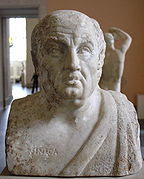 Seneca (Lucius Annaeus Seneca or Seneca the Younger) was a Stoic philosopher and writer who lived during the first century A.D. (3 B.C. – 65 A.D.) just as the kingdom of God was taking root throughout the Roman Empire. Seneca was a respected and influential man in Rome, as is evidenced by his being selected as Nero’s tutor. Unfortunately, Nero wasn’t as good a student as Seneca was a philosopher because as Roman Emperor Nero would initiate the first great Roman persecution against the Christians. One of his sadistic acts was to use Christians as human torches to light his garden parties at the palace.
Seneca (Lucius Annaeus Seneca or Seneca the Younger) was a Stoic philosopher and writer who lived during the first century A.D. (3 B.C. – 65 A.D.) just as the kingdom of God was taking root throughout the Roman Empire. Seneca was a respected and influential man in Rome, as is evidenced by his being selected as Nero’s tutor. Unfortunately, Nero wasn’t as good a student as Seneca was a philosopher because as Roman Emperor Nero would initiate the first great Roman persecution against the Christians. One of his sadistic acts was to use Christians as human torches to light his garden parties at the palace.
Seneca, however, was a different story. When Nero seemed intent on killing every possible contender for his throne, Seneca told him, “However many people you slaughter, you cannot kill your successor.” He was a smart guy. He was also well-respected by the Christians, and his writings aligned so often with Christian teaching, many Christians believed Seneca was secretly a Christian.
Seneca’s brother was Gallio, the Roman governor of Achaia who refused the Jews’ request to punish the Apostle Paul for preaching the Gospel in Corinth. (Acts 18:12-17).
With that introduction, here are some quotes from Seneca’s writings, so you can decide for yourself whether a Stoic can sometimes stumble onto truth:
(On discipleship): “…the road is long if one proceeds by way of precepts but short and effectual if by way of personal example.”
“Man’s ideal state is realized when he has fulfilled the purpose for which he was born.”
“A guilty person sometimes has the luck to escape detection, but never to feel sure of it.”
“He needs but little who desires but little. He has his wish whose wish can be to have what is enough.”
“With afflictions of the spirit, the opposite is the case: the worse a person is, the less he feels it.”
GS


